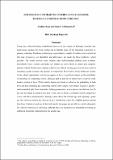| dc.contributor.author | Rose, Pauline | |
| dc.contributor.author | Al-Samarrai, Samer | |
| dc.coverage.spatial | Ethiopia | en_GB |
| dc.date.accessioned | 2014-01-20T10:59:11Z | |
| dc.date.available | 2014-01-20T10:59:11Z | |
| dc.date.issued | 1997 | |
| dc.identifier.citation | Rose, P. & Al-Samarrai, S. (1997) Household Constraints on Schooling by Gender: Empirical Evidence from Ethiopia, IDS Working Paper 56, Brighton: IDS. | en_GB |
| dc.identifier.uri | https://opendocs.ids.ac.uk/opendocs/handle/20.500.12413/3360 | |
| dc.description.abstract | Using data collected during school-based surveys in two regions in Ethiopia, bivariate and
multivariate analysis has been carried out to identify some of the important constraints to
primary schooling. Problems in obtaining a representative sample of children not in school for
this type of analysis are identified, and allowances are made for these problems, where
possible. The results provide some evidence that well-nourished children from wealthier
households whose mother and father are literate are more likely to attend and complete
primary school. Furthermore, starting school at the official starting age of seven years and not
repeating a grade increases the chances of completion. For children living within the vicinity
of the school, opportunity costs do not appear to have a significant impact on the probability
of attending or completing school, although girls in and out of school have a heavier work
burden, relative to boys. Whilst similar factors are found to influence the probability of both
boys and girls attending and completing school in the sample, their impact on girls is greater –
undernourished girls from households lacking possessions, whose parents are illiterate, are 20
per cent less likely to attend school and 16 per cent less likely to complete school compared to
a boy with these characteristics. Starting school above the official age and repeating a grade
are also shown to reduce the chances of girls completing school by a slightly greater amount
than boys. Statistical analyses of the kind used in this paper are not able to control adequately
for cultural constraints to schooling, although these are recognised as potentially providing an
additional important explanation for the gender gap. | en_GB |
| dc.language.iso | en | en_GB |
| dc.publisher | IDS | en_GB |
| dc.relation.ispartofseries | IDS working papers;56 | |
| dc.rights.uri | http://www.ids.ac.uk/files/dmfile/IDSOpenDocsStandardTermsOfUse.pdf | en_GB |
| dc.subject | Education | en_GB |
| dc.subject | Gender | en_GB |
| dc.title | Household Constraints on Schooling by Gender: Empirical Evidence from Ethiopia | en_GB |
| dc.type | IDS Working Paper | en_GB |
| dc.rights.holder | Institute of Development Studies | en_GB |
| dc.identifier.koha | 81988 | |

